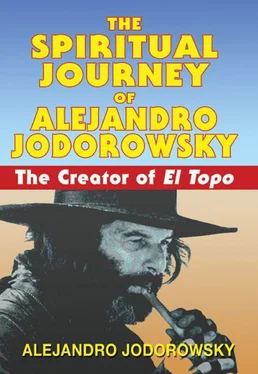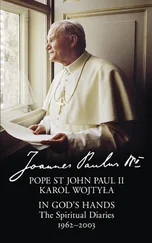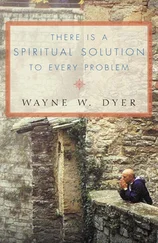Tokusan bowed his head in recognition that self-consciousness is the last trap. Seppo’s words, like the wind blowing away the clouds, enabled Tokusan to realize that seeing his own perfection is an imperfection. To be in unity is to conquer the dualism of actor-observer. Tokusan returned to his cell — that is, to himself. He still had to learn to dissolve himself, to offer his consciousness as the ultimate gift to the eternal void, leaving aside all metaphysical search. The mysterious commentary by Seppo about Tokusan not having understood the last verse refers to a tradition borrowed from ancient China by Zen masters. In their last moments, enlightened sages would write a poem, leaving the essence of their life experience to their disciples or to their children. The Buddhist monk Zhi Ming, *15condemned to die, dictated this poem before his head was cut off:
Illusory birth, illusory death.
The great illusion does not survive the body.
But one idea calms the mind:
If you look for a man, no man exists.
I related this interpretation to Ejo: “Empty mind: nothing to wait for, nothing to receive.”
His response was to recite another poem by a dying monk: “In this world burns a rootless tree, its ashes blown away by the wind.”
At this moment, a gust of wind made our kimonos flap. We had spent the entire day discussing koans. It was already dark, but night always came so softly here that we hadn’t bothered to light candles on the terrace. Another gust of wind, much longer, ruffled my hair. Ejo, with his bald head, grinned boyishly. The gust died suddenly and left in its wake a marvelous gift: a firefly! Free of the wind’s tyranny, the insect fluttered around the terrace, emitting its phosphorescent bursts of light.
Ejo murmured: “Little star, your language of light offers a teaching to us.”
We remained silent for a long time. Then, for the first time since I had known him, Ejo began to speak of his childhood. He spoke in a childlike voice, conveying nostalgia, sweetness, and fascination.
“I was an only child. I was five years old on that moonless night, when there appeared many thousands of fireflies, like a river of stars rushing through time. That was the night when my mother, distraught by the first wrinkles that signaled the decline of her beauty, decided to drown herself in Omi Lake. My father never got over her suicide. Lacking the courage to kill himself, he began to drink. This slow suicide plunged us into abject poverty. Most of the year, we depended on public charity. He emerged from his drunkenness only with the onset of summer, when he wore around his waist a bamboo stick wrapped to a big net sack and took me with him to the willow forest along the shores of Omi Lake. We lived in the region of Ishiyama, a province of Goshu, where several merchants specialized in buying and selling fireflies. They sent them to big cities in little wicker boxes. Rich city dwellers avidly bought these little creatures and then released them for their feasts so that everyone could admire their scintillating beauty.
“The more frightened fireflies are, the more brilliantly they shine. If you startle them, they become paralyzed for a time before taking flight. Kyubei, my father, hated these insects, blaming them stubbornly for triggering my mother’s fatal depression. Like a silent cat, he sneaked up until he detected their presence among the willow leaves. Leaping out suddenly, he began striking the leaves violently with the long bamboo stick. The insects froze, and fell to the ground, shining brightly like countless precious jewels. In order to collect as many of them as fast as possible, my father scooped them rapidly into his mouth. When it was so full he couldn’t hold any more, he spit them into the covered net sack that I held open and then closed quickly.
“The night was as dark as this one. My father was dressed in black so that the insects would not see his approach. Suddenly, in the total darkness, his cheeks began to shine. The insects inside his mouth were frantic and shone with such great intensity that the light lit up his cheeks like a red lantern. When he spit out his prisoners, a luminous jet spewed from his mouth. I gathered this stream of light into the net sack, which became my soul. I imagined my father as a kind of demonic god, expelling his power into me, the transmission of a mysterious gift of knowledge.
“My father was glad to punish these insidious phantoms who had stolen my mother — he firmly believed that the light of each insect was the burning soul of a dead person. When we returned to our humble home, with me carrying a sack of at least five hundred insects, he would recite haiku passed down to him from his ancestors and I had tears of joy, wishing that this summer would never end.”
Ejo paused, sighed deeply, and murmured: “Permanent impermanence.” Drying the tears on his cheeks with the ample sleeves of his robe, he lit a candle. Then, after a loud burst of laughter, he recited:
Mizu e kite,
Hikuu naritaru
Hotaru kana!
In a raucous voice, he recited it again, this time separating and counting the syllables of each verse:
Mi-zu e ki-te. . five
Hi-ku-u na-ri-ta-ru. . seven
Ho-ta-ru ka-na. . five
He smiled with satisfaction. “Five, seven, five: a haiku. The first five, like the fingers of a hand, signify ordinary human reality. The seven, like the seven chakras, signify awakened mind, cosmic unity. The third five return to ordinary reality, but this time with something new, the light of consciousness.
Chiding him playfully, I said: “Your poem is beautiful, Ejo, with a mystical rhythm. But remember — I’m not Japanese. Would you be so kind as to translate it for me?”
To my astonishment, this foreigner who did not speak Spanish very well rapidly produced a translation:
Llegando al agua
hace una reverencia
la luciérnaga! *16
Arriving at the water
the firefly dips in a gesture
of reverence!
This was the first time Ejo had ever spoken of his personal life. I was moved by this revelation of the vulnerable, nostalgic child in him who was still there after so many years of meditation. Did he seldom speak of them because these memories were not an obstacle, but an intimate treasure? For an instant my personal limits faded, my body merged with the cosmos, the roots of my thoughts were the stars, and Ejo’s past was my own. I ventured to comment upon the haiku.
“The water is that of an ancient pond, calm and undisturbed — no birth or death, always there, like eternity. Halting its labyrinthine flight — in other words, freeing ourselves from identification with our thoughts — the firefly, like the awakened human being, arrives at the border where concepts dissolve in the infinite void before it drinks and communes with the world, accepting the unending change of everything that was thought to be fixed and permanent, making a gesture of reverence in gratitude for its ephemeral life.”
As Ejo listened to my interpretation, an invisible bridge joined his mind to mine. His huge grin made me guess that we were about to embark on a new game: he would recite and I would interpret. I was not mistaken. He went down to the kitchen and returned with a bottle of warm sake. After several toasts, he proposed another haiku:
Akenureba
Kusa no ha nomi zo
Hotaru kago!
The dawn returns
Firefly in its cage
Only grass!
I replied: “When dawn comes, the light of the sun makes the fireflies opaque. No enlightenment, no ignorance, no master, no disciple — drunk all together, we will sing like frogs who swallow fireflies and croak at the moon with phosphorescent bellies.”
Читать дальше












